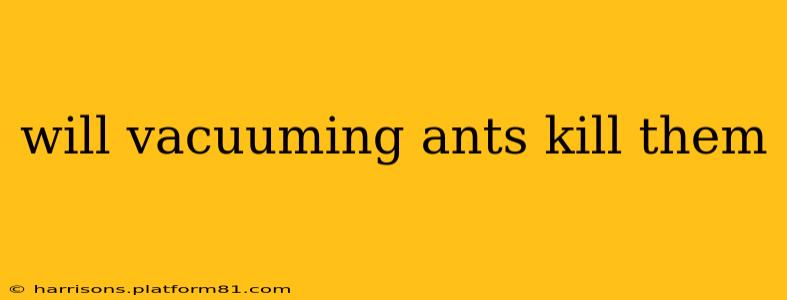Will Vacuuming Ants Kill Them? A Comprehensive Guide to Ant Control
Vacuuming ants might seem like a quick and easy solution to an ant infestation, but does it actually work? The answer, unfortunately, is more complex than a simple yes or no. While vacuuming can certainly remove a significant number of ants from your home, it's not a foolproof method for complete eradication, and may even backfire if not done correctly. Let's delve into the details.
Does vacuuming kill ants instantly?
This depends largely on the suction power of your vacuum cleaner and the type of ant. While a powerful vacuum can certainly crush many ants, some may survive the initial suction. Smaller ants, in particular, might withstand the force and escape later. Additionally, the vacuuming process only affects the ants you can visibly see—it doesn't address the colony's source or hidden nests.
What happens to the ants after vacuuming?
Even if the ants are crushed, the vacuum bag or canister now contains a significant amount of ant corpses. This can lead to a lingering ant smell and potentially attract more ants, or even other pests attracted to the decaying insects. If you’re not careful about emptying the vacuum, you risk spreading the colony further by inadvertently releasing some survivors.
Is vacuuming effective in the long run?
No, vacuuming alone is generally not an effective long-term solution for ant control. While it can temporarily reduce the visible ant population, it doesn't address the root of the problem: the ant colony itself. The queen and the majority of the colony will likely remain undisturbed, ensuring that the infestation continues to regenerate.
What are better ways to get rid of ants?
To effectively eliminate an ant infestation, you need to tackle the source. This often involves:
- Identifying and eliminating the colony: Finding the nest is key. Look for cracks in walls, gaps under appliances, or areas with moisture. Once located, you can use appropriate insecticides or natural deterrents.
- Cleaning up food and water sources: Ants are attracted to food and water. Regularly cleaning up crumbs, spills, and ensuring proper storage of food will greatly reduce the appeal of your home to ants.
- Using ant baits: Ant baits contain slow-acting poisons that worker ants carry back to the colony, effectively eliminating the entire colony over time.
- Sealing entry points: Caulk any cracks or gaps in your walls or foundation to prevent ants from entering your home.
- Professional pest control: If the infestation is severe or persistent, consider contacting a professional pest control service. They have the expertise and tools to effectively and safely eliminate ant colonies.
Can vacuuming ants be part of a larger ant control strategy?
Vacuuming can certainly be part of a comprehensive ant control strategy, but it shouldn't be the sole method. Use vacuuming to remove visible ants, but always combine this with other methods to target the colony and prevent future infestations. Regular vacuuming can also help remove ant trails, making it more difficult for ants to locate food sources within your home.
In conclusion, while vacuuming ants might offer temporary relief, it’s far from a complete solution. A multi-pronged approach targeting the colony and addressing attractive factors within your home is essential for effective long-term ant control. Remember to empty your vacuum bag immediately and thoroughly afterward to avoid attracting more pests or spreading the infestation!
